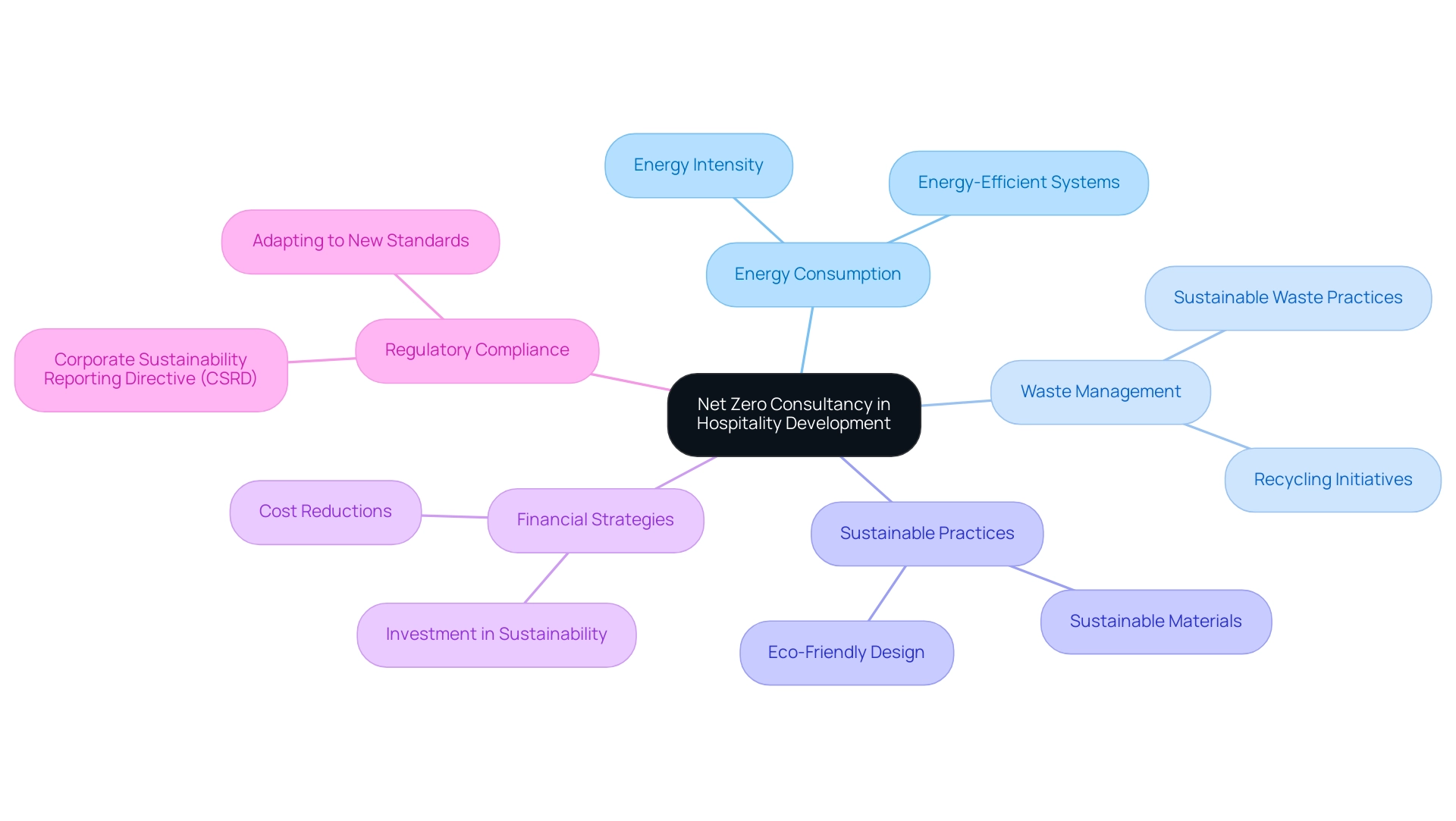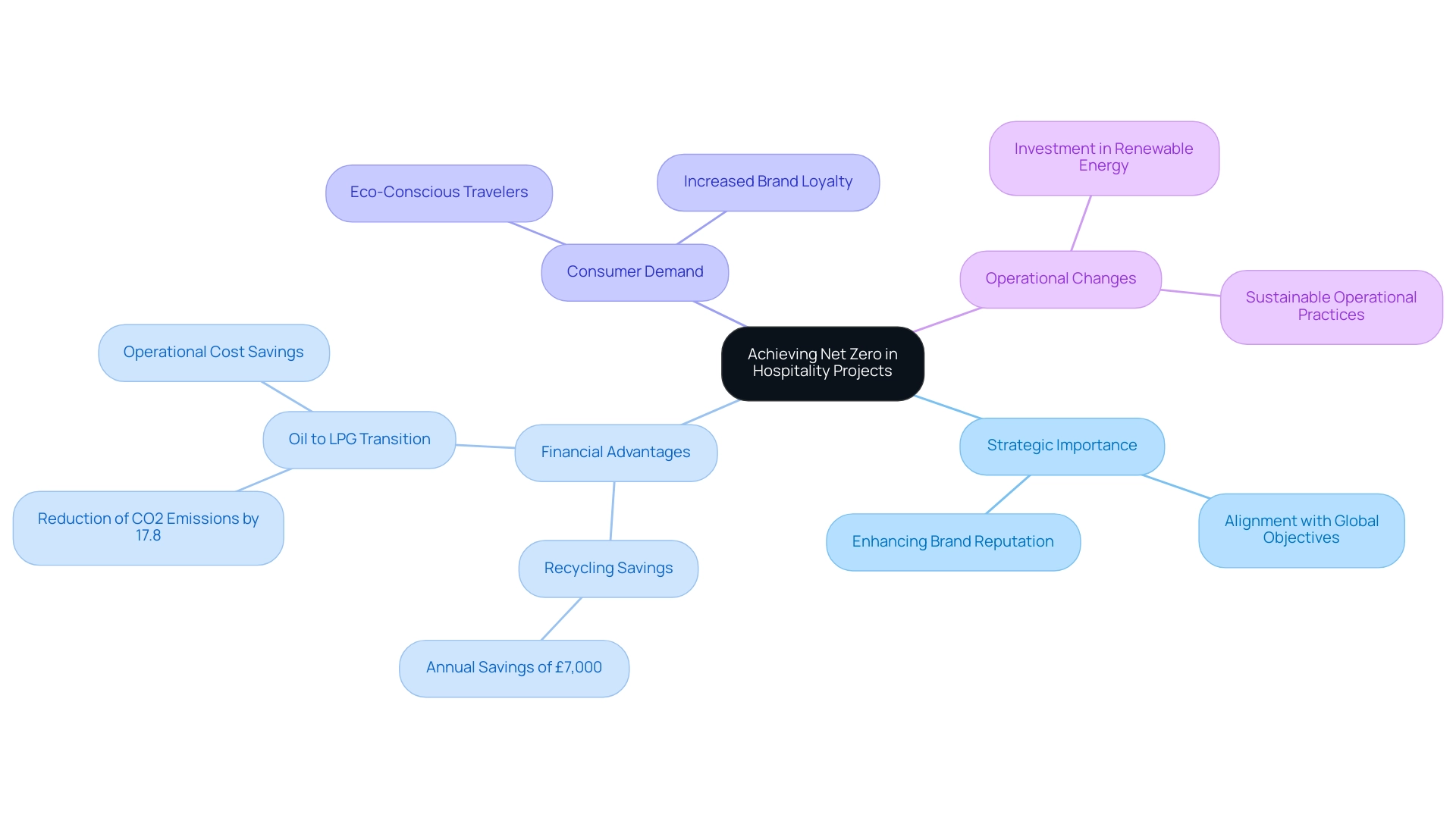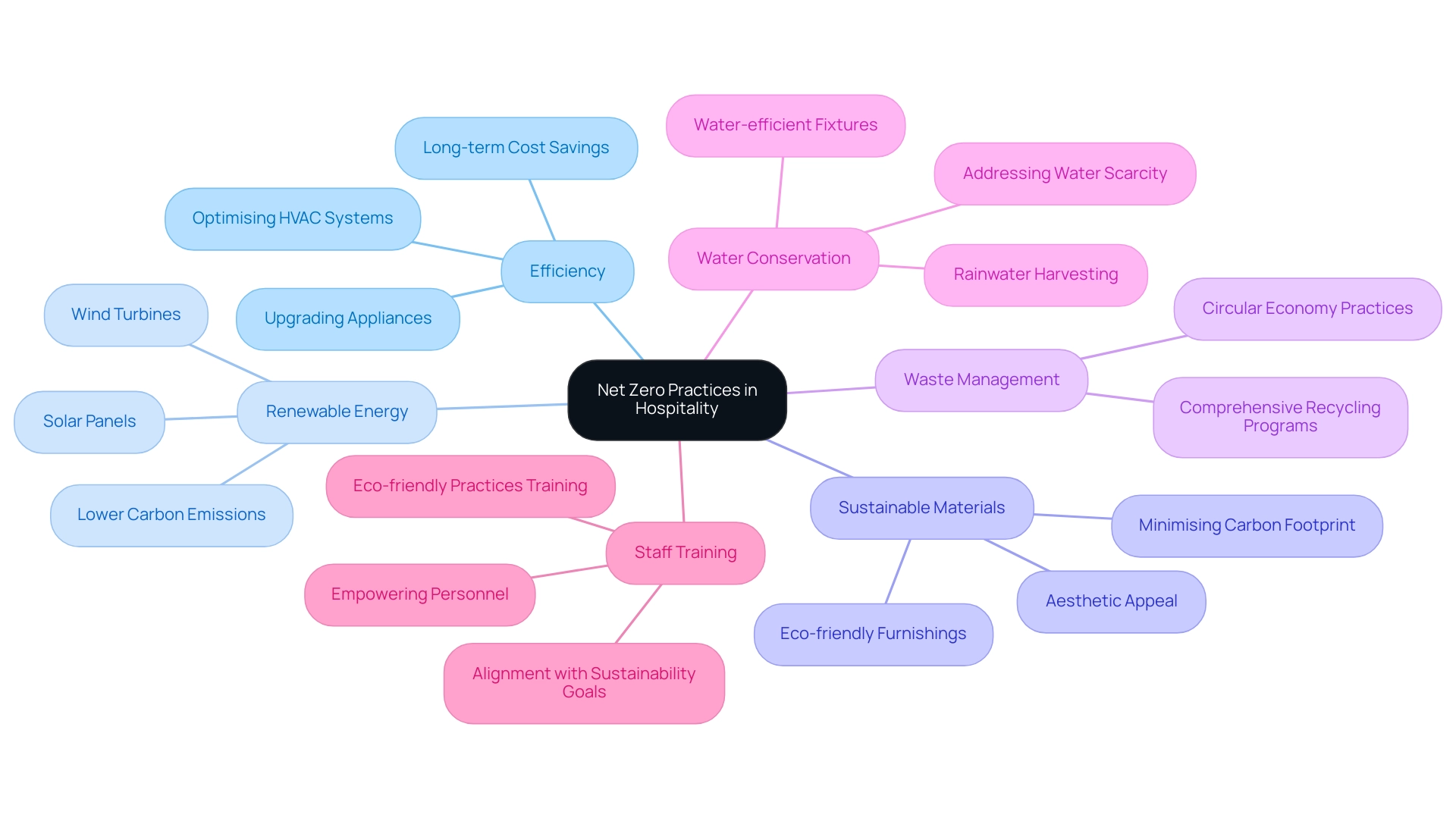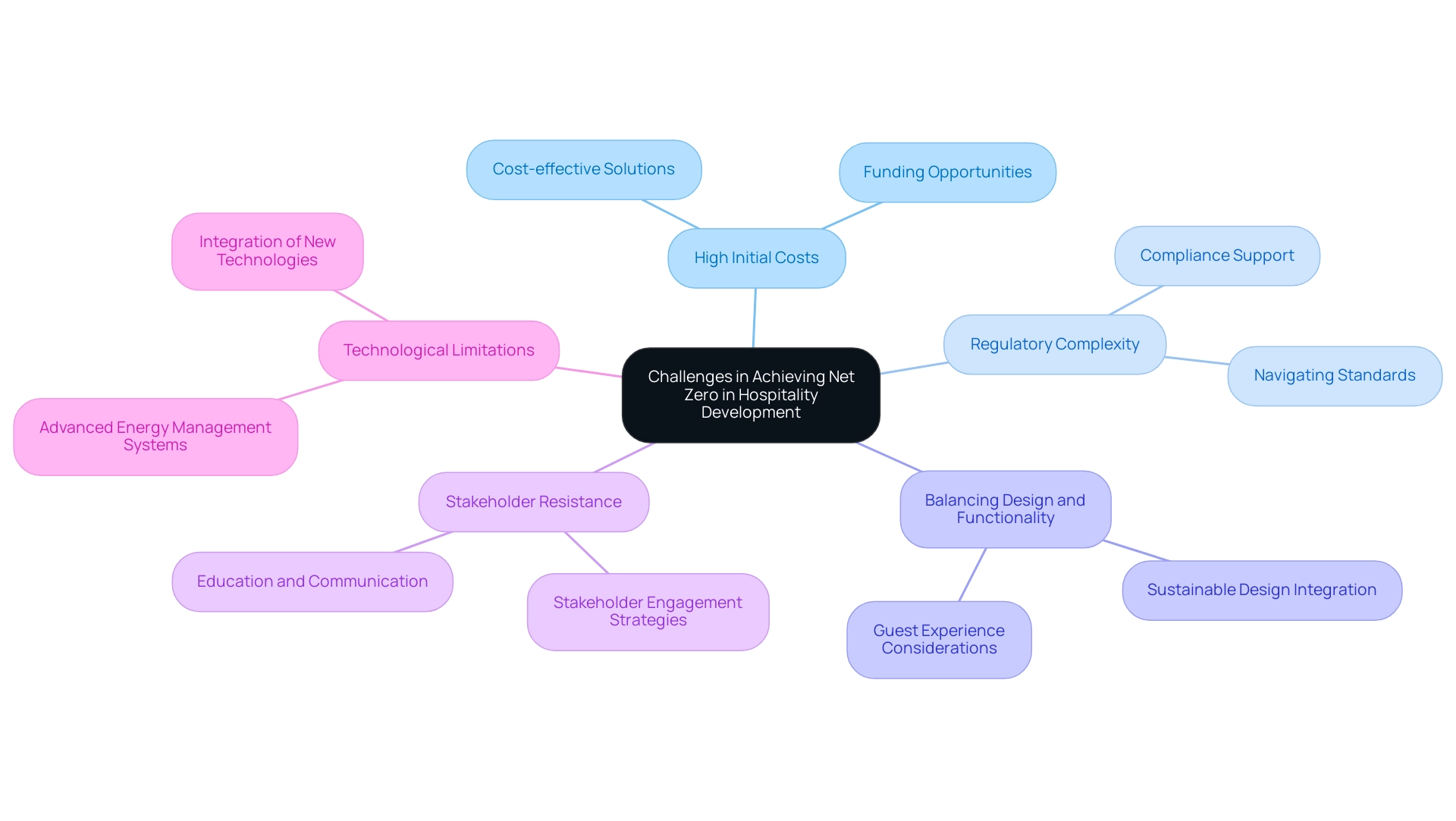27 Mar 2025
BlogOverview
Net zero consultancy in hospitality development addresses the pressing need to balance greenhouse gas emissions through sustainable practices. These practices not only comply with regulatory requirements but also significantly enhance guest experiences and operational efficiency. By implementing strategies such as:
- Energy efficiency
- Renewable energy investments
- Stakeholder engagement
businesses can achieve substantial cost savings and bolster their brand reputation. This dual benefit of environmental responsibility and profitability is essential in today’s service industry.
Consider the impact of these strategies: energy-efficient systems reduce operational costs while renewable energy investments not only lower carbon footprints but also appeal to eco-conscious consumers. Engaging stakeholders fosters a community-oriented approach, further enhancing brand loyalty. Ultimately, the journey towards net zero is not just a regulatory obligation; it is a pathway to sustainable growth and innovation in hospitality.
In conclusion, embracing net zero consultancy is a strategic move for hospitality developers. It is an opportunity to lead the industry towards a more sustainable future while reaping the rewards of enhanced operational efficiency and guest satisfaction.
Introduction
In the rapidly evolving landscape of hospitality development, the pursuit of net zero sustainability stands as a critical imperative. This strategic framework not only addresses the pressing need to balance greenhouse gas emissions but also enhances the overall guest experience by embedding sustainability into the core values of hospitality businesses.
As the sector grapples with challenges related to energy consumption and waste management, innovative solutions and financial strategies are essential for navigating the complexities of achieving net zero objectives. Consider the impact of energy-efficient systems and sustainable materials; the commitment to sustainability is reshaping operational practices and attracting eco-conscious consumers.
As the industry starts 2025, understanding the significance of net zero consultancy becomes paramount for developers aiming to create a lasting positive impact on both their communities and the environment.
Understanding Net Zero Consultancy in Hospitality Development
The evolution of the service industry through net zero consultancy represents a strategic framework aimed at balancing greenhouse gas emissions with their removal from the atmosphere. This approach necessitates a comprehensive understanding of energy consumption, waste management, and sustainable practices, all tailored to the unique requirements of hospitality projects. By harnessing innovative solutions and financial strategies, developers can effectively navigate the complexities associated with achieving net zero objectives.
The significance of this consultancy extends beyond mere regulatory compliance; it enhances the overall guest experience by embedding eco-friendliness as a core value within the establishment. For instance, the incorporation of energy-efficient systems and the utilisation of sustainable materials not only contribute to environmental objectives but also result in considerable reductions in operational costs.
Current trends reveal a heightened focus on the intensity of power, which gauges consumption per unit of GDP generated. This metric is shaped by advancements in energy efficiency and technology, highlighting the necessity of adopting best practices in hospitality development. As the industry progresses, successful projects increasingly demonstrate their dedication to net zero goals, illustrating that eco-friendliness can harmonise with profitability.
A prominent case study is the Corporate Sustainability Reporting Directive (CSRD), which mandates more comprehensive ecological reporting from companies. Edmond Shipway is strategically positioned to support clients in adapting to these new standards, thereby enhancing their credibility and commitment to sustainability. This transition not only aligns with regulatory expectations but also cultivates a culture of transparency and accountability in service development.
The shift towards net zero isn’t just good for the environment, it’s driving investment, creating skilled jobs, and securing long-term prosperity for our community.
In 2025, the significance of net zero consultancy in service industry projects cannot be overstated. As the sector continues to confront challenges related to energy consumption and waste management, the implementation of effective net zero consultancy practices will be vital for achieving environmental objectives. By prioritising these initiatives, developers in the service industry can not only fulfil regulatory requirements but also leave a lasting positive impact on their communities and the environment.
Edmond Shipway’s tailored services as a net zero consultancy aim to assist developers in overcoming these challenges, ensuring that eco-friendliness is prioritised in their projects.

The Importance of Achieving Net Zero in Hospitality Projects
Achieving net zero in consultancy for service projects is not merely about regulatory compliance; it represents a strategic imperative that aligns with global environmental objectives. The service industry significantly contributes to carbon emissions, highlighting the pressing need for businesses to implement practices that reduce their environmental impact. By committing to net zero, developers in the accommodation sector can enhance their brand reputation and attract eco-conscious consumers, tapping into a burgeoning market segment that prioritises sustainability.
Edmond Shipway’s expertise in the industry is exemplified through notable case studies, including a project valued at £18.5 million, where effective project management and cost consultancy were pivotal in meeting sustainability targets. Furthermore, projects valued at £252 million further demonstrate Edmond Shipway’s capabilities in delivering successful outcomes within the service industry. The financial advantages of achieving net zero are substantial.
For example, service industry businesses can save up to £7,000 annually by implementing efficient recycling and food reuse strategies before waste is generated. Additionally, transitioning from oil-fuelled boilers to liquefied petroleum gas (LPG) can reduce CO2 emissions by as much as 17.8%, while also contributing to operational cost savings through improved efficiency.
As governments and organisations increasingly emphasise sustainability, the ability to showcase a commitment to net zero consultancy offers service industry businesses a competitive edge. Hotels investing in renewable energy sources and sustainable operational practices often see a significant return on investment, not only through lower energy costs but also through increased customer loyalty.
By 2025, the importance of achieving net zero in service projects will be underscored by rising consumer demand for environmentally responsible practices, reinforcing the role of net zero consultancy. Developers who prioritise environmental responsibility are likely to enhance their brand reputation and increase market share, as eco-conscious travellers seek accommodations that align with their values. Integrating eco-friendliness into the core business strategy is no longer optional; it is essential for long-term success in the service sector.
Edmond Shipway’s extensive construction consultancy services, particularly their net zero consultancy, underscore project management, cost efficiency, and environmental responsibility, positioning them as leaders in guiding developers toward these critical goals.

Key Strategies for Implementing Net Zero Practices in Hospitality
Implementing net zero practices in hospitality requires a multifaceted approach, encompassing several key strategies that can significantly enhance sustainability efforts:
- Efficiency: Upgrading to efficient appliances, leveraging smart building technologies, and optimising HVAC systems can lead to substantial reductions in consumption. Notably, hotels typically allocate nearly half of their utility costs to heating and water, underscoring the importance of efficiency as a focal point. Successful implementations in the service industry illustrate that investments in net zero consultancy can yield long-term cost savings while enhancing the property’s environmental credentials.
- Renewable Energy: Investing in renewable energy sources, such as solar panels and wind turbines, not only offsets energy use but also plays a crucial role in lowering carbon emissions. The service industry has seen successful implementations demonstrating that these investments can lead to long-term cost savings while bolstering the property’s environmental standing.
- Sustainable Materials: Choosing sustainable building materials and furnishings is essential for minimising the carbon footprint. This decision not only supports environmental goals but also enhances the aesthetic appeal of the property, aligning with modern consumer preferences for eco-friendly accommodations.
- Waste Management: Establishing comprehensive waste reduction and recycling programmes minimises landfill contributions and fosters a circular economy. Efficient waste handling methods are increasingly recognised as critical components of environmental strategies within the service industry.
- Water Conservation: Installing water-efficient fixtures and systems is vital for reducing overall water usage. This initiative not only supports environmental objectives but also addresses the growing concern regarding water scarcity in various regions.
- Staff Training: Training staff on eco-friendly practices is essential for ensuring alignment with net zero consultancy objectives and empowering personnel to actively contribute to these goals. A well-informed team can drive initiatives that enhance energy efficiency and promote renewable energy adoption.
By embracing these strategies, developers in the service industry can cultivate a sustainable environment that not only meets regulatory requirements but also aligns with evolving consumer expectations.

Navigating Challenges in Achieving Net Zero in Hospitality Development
Achieving net zero in hospitality development presents a range of significant challenges that developers must navigate effectively.
- High Initial Costs: The upfront investment for energy-efficient systems and sustainable materials often serves as a substantial barrier. Dining establishments, for instance, can consume more energy from lighting and storing perishable items, underscoring the importance of energy-efficient technologies. While the long-term savings from these technologies can be considerable, the initial financial outlay can deter many developers from pursuing these options. Edmond Shipway can assist in identifying cost-effective solutions and funding opportunities to mitigate these initial costs.
- Regulatory Complexity: The landscape of environmental regulations is intricate and constantly evolving. Developers, especially smaller operators, may find it daunting to keep up with the myriad of standards and compliance requirements, which can vary significantly by region. Edmond Shipway’s expertise in navigating these regulations can provide invaluable support to ensure compliance and streamline the development process.
- Balancing Design and Functionality: Striking a balance between aesthetic appeal and practical durability is crucial. Developers must ensure that their designs not only meet sustainability goals but also resonate with guests’ expectations for comfort and style, which can sometimes lead to conflicting priorities. Edmond Shipway’s consultancy services can help integrate sustainable methods into design without compromising guest experience.
- Stakeholder Resistance: Engaging stakeholders who may be skeptical about the benefits of net zero can impede progress. Effective communication and education about the long-term advantages of sustainable practices are essential to overcoming this resistance. Edmond Shipway can facilitate stakeholder engagement through tailored presentations and workshops.
- Technological Limitations: The integration of advanced technologies for energy management and monitoring can be challenging. Developers must stay informed about the latest innovations and ensure that these technologies can be seamlessly incorporated into their projects. Edmond Shipway stays at the forefront of technological advancements, providing insights and recommendations for effective implementation.
Recognising these challenges allows hospitality developers to proactively seek solutions through net zero consultancy. Strategies such as phased implementation of eco-friendly measures, securing funding or incentives, and fostering open communication with stakeholders can significantly enhance the likelihood of successful outcomes.
Furthermore, adoption of energy-saving methods, such as solar panels and energy-efficient heating systems, acts as a practical example of overcoming obstacles in the accommodation sector. By tackling these obstacles directly, developers can create a more enduring future in the service industry, utilising Edmond Shipway’s legacy in cost consultancy and contemporary methods in project management and environmental responsibility.

Engaging Stakeholders for Successful Net Zero Outcomes
Engaging stakeholders is pivotal for realising successful outcomes in hospitality development through net zero consultancy. Effective strategies to foster this engagement include:
- Transparent communication, which articulates the benefits and objectives of net zero initiatives, cultivating trust and securing stakeholder buy-in.
- Clear messaging helps stakeholders comprehend the value of environmental efforts, aligning their interests with project goals.
Participation in decision-making is crucial; actively engaging stakeholders in planning and decision-making processes fosters a sense of ownership and commitment to environmental goals. This collaborative approach not only enhances stakeholder investment but also leads to more innovative solutions.
Regular updates and feedback are essential. Consistent communication regarding progress and soliciting stakeholder feedback keeps everyone informed and engaged. This practice promotes a culture of transparency and accountability, vital for maintaining momentum in environmental initiatives. Additionally, forming collaborative partnerships with local communities, suppliers, and environmental organisations can significantly enhance resources and support for net zero initiatives.
These partnerships can result in collective understanding and optimal methods, improving the overall efficiency of eco-friendly initiatives. Training and education play a critical role as well. Offering training sessions on eco-friendly methods enables stakeholders to participate significantly in the net zero journey. By providing them with essential knowledge and skills, developers can ensure that all parties are aligned and capable of advancing environmental initiatives.
By focusing on these stakeholder engagement methods, developers in the service industry can cultivate a cooperative atmosphere that not only aids the effective execution of their net zero consultancy approaches but also improves overall project results. Edmond Shipway’s comprehensive construction consultancy services, particularly their net zero consultancy, can play a crucial role in facilitating these strategies by leveraging their multi-sector expertise to ensure effective stakeholder engagement and sustainable practices in development.
Future Trends in Hospitality Development and Net Zero Sustainability
The future of service development is increasingly intertwined with sustainability and the goals set by net zero consultancy. Key trends to monitor include:
- Smart Technology Integration: The implementation of advanced devices and advanced building management systems is poised to transform resource efficiency and operational performance in service environments. These technologies enable real-time monitoring and control of energy consumption, significantly reducing waste and costs. Notably, the hotel market’s integration of AR/VR technologies is projected to grow at a rate of over 30% by 2028, further enhancing guest experiences and operational efficiencies.
- Sustainable Design Practices: A growing emphasis on biophilic design and sustainable architecture will shape the development of accommodation spaces. This approach not only enhances aesthetic appeal but also fosters a connection with nature, promoting well-being among guests and staff alike.
- Carbon Offsetting Initiatives: As part of their sustainability strategies, service-oriented businesses are increasingly investing in carbon offsetting projects. Initiatives such as reforestation and renewable energy projects are becoming essential for balancing emissions and demonstrating a commitment to environmental stewardship.
- Consumer Demand for Sustainability: With a growing awareness of environmental concerns, consumers are actively pursuing sustainable practices in the service industry. This shift in purchasing behaviour compels developers to prioritise eco-friendly solutions, thereby influencing market dynamics. The trend towards unbundled services in the sector reflects this change, as travellers prefer to customise their stays according to personal preferences and budgets, allowing hotels to cater to diverse needs without unnecessary extras.
- Collaboration Across Industries: The merging of the service industry, technology, and eco-friendliness sectors is fostering innovative partnerships. These collaborations are crucial for developing comprehensive solutions related to net zero consultancy, facilitating the transition to net zero, driving progress, and enhancing operational efficiencies.
By remaining attuned to these trends, hospitality developers can position themselves as frontrunners in sustainability, thereby enhancing their competitive edge in an evolving market.
Conclusion
The journey toward achieving net zero in hospitality development transcends mere regulatory compliance; it embodies a vital strategy that resonates with the global shift toward sustainability. This article has underscored the pivotal role of net zero consultancy in navigating the intricacies of energy consumption, waste management, and sustainable practices specifically tailored for the hospitality sector. By integrating innovative solutions and financial strategies, developers can not only enhance their operational efficiency but also attract a growing base of eco-conscious consumers.
Key strategies such as energy efficiency, renewable energy investment, and sustainable materials selection have been identified as foundational elements in this transition. Moreover, addressing challenges such as high initial costs and regulatory complexities is essential for successful implementation. Engaging stakeholders through transparent communication and collaborative partnerships further solidifies the commitment to sustainability, ensuring that all parties are aligned with the overarching goals.
As the industry enters 2025, the significance of prioritising net zero objectives becomes increasingly apparent. The hospitality sector finds itself at a crucial juncture where a commitment to sustainability not only fosters a positive environmental impact but also bolsters brand reputation and customer loyalty. By embracing these principles, hospitality developers can create enduring positive effects on their communities and the environment while securing their position in a competitive market. The future of hospitality development is undeniably intertwined with sustainability, paving the way for innovations that will shape the industry for years to come.
Share


